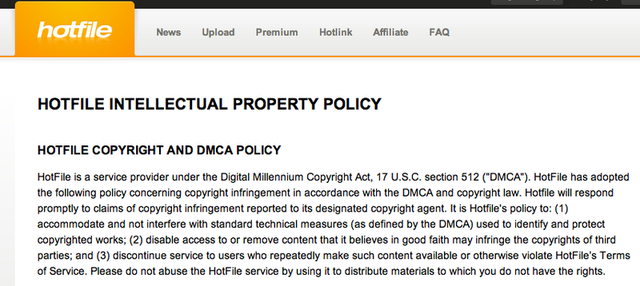With file sharing site Hotfile facing an attempt by film studios to shut it down, Google has argued in an amicus brief that Hotfile should be eligible for the same type of legal protection that allowed the Google-owned YouTube to fend off the famous copyright infringement lawsuit filed by Viacom.
Google's brief (via TorrentFreak) says the company is not taking a position on what the final outcome of the Hotfile case should be, but states that the movie studios' interpretation of the DMCA (Digital Millennium Copyright Act) would significantly weaken the DMCA's safe harbor protections that have protected many of the Internet's most popular and vital websites.
"A wide variety of online services, including Amazon.com, eBay, and YouTube... have all been held protected by the DMCA against potentially crippling infringement claims," Google wrote in a filing in US District Court in Southern Florida. "Other mainstays of the modern Internet, such as Facebook, Twitter, and Wikipedia, likewise rely on the DMCA safe harbors in their everyday operations. Without the protections afforded by the safe harbors, those services might have been forced to fundamentally alter their operations or might never have launched in the first place."
Film studios Disney, 20th Century Fox, Universal, Columbia, and Warner Bros. argued that Hotfile induced users to commit copyright infringement, disqualifying the site from safe harbor protections. The studios cited the MGM vs. Grokster Supreme Court decision from 2005, saying the case "holds that a defendant who operates a service with the 'object' that it be used to infringe is liable for the resulting acts of infringement by third parties." Inducement is also an important issue in the case regarding Megaupload, as we've explained in previous coverage.
Google objected to this argument, saying that the DMCA should protect defendants against claims of both direct infringement and "secondary infringement" such as inducement. "As in Viacom, the same facts that demonstrate a defendant’s entitlement to the safe harbors may help establish that it is not an inducer," Google wrote. "But it would be a significant mistake to hold, as plaintiffs urge, that a finding of secondary liability [such as inducement] in and of itself disqualifies a service provider from the safe harbor."
The Google brief seems somewhat contradictory, arguing in one part that the safe harbor question should be treated separately from the inducement question, and in another that a service provider who qualifies for DMCA safe harbor "is protected against damages liability for all forms of copyright infringement," including inducement.
Google: "Hotfile did exactly what the DMCA demands"
Although the company claimed not to take a position on the case's final outcome, Google defended Hotfile against some of the specific infringement allegations.
"Plaintiffs make much of the fact that Hotfile, at least for a time, apparently removed only the specific download link identified as infringing in a given DMCA takedown notice, and did not take the additional step of blocking other files on its system (not called out in the notice) that might have also have contained the copyrighted work at issue," Google's brief states. "But, in this respect, Hotfile did exactly what the DMCA demands, and plaintiffs’ takedown notices cannot be used to charge the service with knowledge of allegedly infringing material that those notices did not specifically identify."

Google wrote that a service provider can only lose DMCA safe harbor protection if it has "actual knowledge" of infringing material on its systems and fails to remove it, or if it receives financial benefit directly attributable to infringing activity that the service provider was aware of and failed to stop. The DMCA does not require service providers to monitor services for possible infringement, but they do have to act if notified of infringement, Google said.
Google's brief was filed on March 12. The film studios issued their response yesterday, saying the court should not allow Google's brief to be considered during the case. The brief "merely duplicates" Hotfile's position, and seems designed to help Hotfile circumvent the page limits imposed to prevent the sides from filing arguments that are too long, the studios said. Google is also trying to help itself in pending litigation, including Viacom's appeal of the YouTube ruling, the studios wrote.
"Google's proposed brief appears to be part of a systematic effort by Google, itself a defendant in ongoing copyright infringement cases, to influence the development of the law to Google's own advantage—as well as an effort by Hotfile (whose counsel also represents Google) to circumvent its page limits," the studios wrote. "Although Google purports not to take a position regarding summary judgment here, Google unmistakably seeks a ruling against plaintiffs."
Listing image by getpass.org
reader comments
51